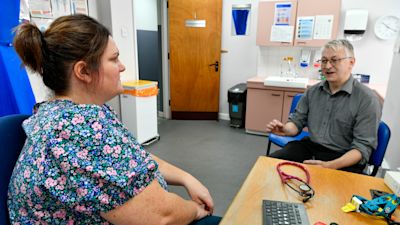Patients in North Cumbria advised about new health care roles as demand on GPs grows

Patients in North Cumbria are being advised about getting the right care within GP practices as the NHS enters its busiest period.
Demand for services increases significantly with the onset of cold weather, which brings a rise in respiratory and heart problems, flu-like symptoms and, in recent years, Covid-19.
The added pressure on services comes at a time when there is a national decline in the number of GPs, meaning the NHS and doctors' surgeries are having to adapt to meet the increased demand.
This has included developing a range of alternative roles to deliver healthcare alongside GPs.
Surgeries in North Cumbria are highlighting some of those new roles to help patients understand why they may be directed to other professionals instead of their GP.
Primary Care Networks, where groups of GP Practices work together, can now directly appoint health and care staff to complement the traditional general practice team - including clinical pharmacists, paramedics, occupational therapists, physiotherapists, mental health workers, care co-ordinators, physicians associates and social prescribers.
Dr Robert Westgate, a GP in Carlisle and Chair of North Cumbria’s Primary Care Network, said: "There are huge demands on primary care now – in my GP practice in Carlisle we receive close on 4,000 calls a week, around 15% above pre-Covid levels.
"This equates to approximately 2% of our population making contact with a GP surgery each working day.
"Alongside this increase in demand, we are seeing some patients with very complex problems that need expert medical support, and a reducing number of GPs.
"Over the last couple of years we have been growing our primary care workforce, with new roles bringing different types of expertise into our practices which are helping our patients."
Sarah Sewell was a nurse who wanted to be able to do more to help the patients she was seeing.
After three years of further study and training, she is one of a growing number of Advanced Clinical Practitioners in surgeries.
Sarah said: "It’s about bridging the gap because there are not enough doctors around.
"A lot of things can be managed by us, we can diagnose, treat and prescribe and we can do the ongoing referrals for further tests. We carry our own caseload of patients.
"A lot of us were nurses first and we don’t lose that nurse within us, but it’s about us extending the roles so we can give the right care to the right people at the right time.
"That frees up the GP’s time to look at more complex conditions.”
A video explaining the new roles
The new roles include:
Social Prescribers: This team can spend much longer with individual patients and support them to work through non-medical issues that might be affecting their wellbeing, getting to the root cause of what is wrong and linking them to local help in their own community.
First Contact Physio: Musculoskeletal health issues, such as back ache and neck pain, are the most common cause of repeat GP appointments, accounting for around one in five of all appointments. Expert physios can make onward referrals and help with advice such as exercises to ease the problem.
Care Co-ordinators: Work with people with longer term conditions and build up a longer relationship. They can help anticipate problems, spot deteriorating patients and are a link between the GP and the patient.
Want a quick and expert briefing on the biggest news stories? Listen to our latest podcasts to find out What You Need To Know...